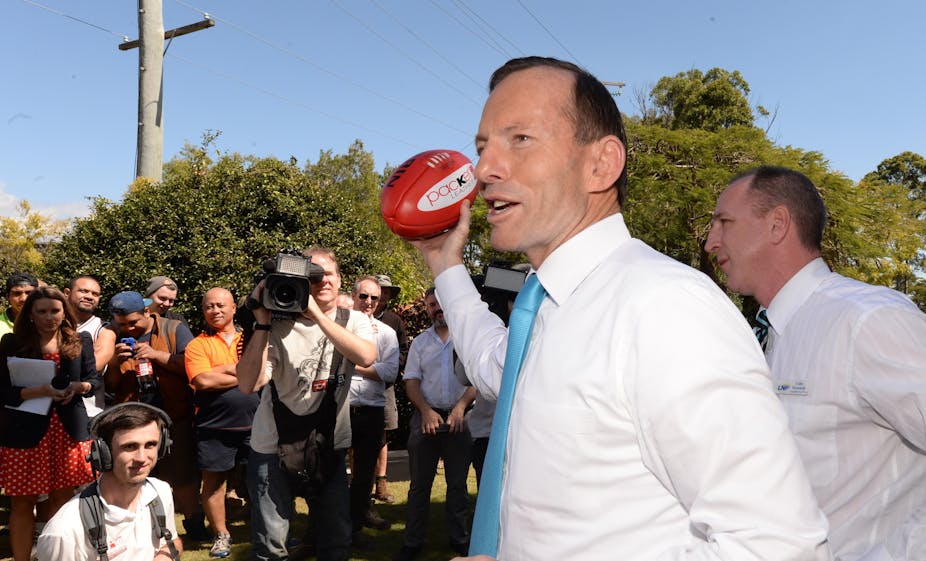In recent days, opposition leader Tony Abbott has more forcefully argued that, if successful in winning the Saturday poll, his new government would have the mandate to scrap the government’s carbon pricing arrangements.
Pricing carbon was one of the Gillard government’s most significant legislative achievements. After several years of debate and discussion, it was the Gillard government that introduced the so-called carbon tax, which would later revert to an emissions trading scheme.
For Labor, it was an important achievement especially as it directly addressed a major policy concern raised by the Greens and independent MPs who were so crucial in keeping Labor on the treasury benches.
The problem for Labor was that many sections of the community appeared to reject the scheme. The negativity facing the scheme was heightened as the opposition constantly reminded voters that she had refused to introduce carbon pricing during the election campaign.
Tony Abbott and the Coalition adopted the position that they would oppose carbon pricing. This served their political interests as vigorous opposition mobilised against the government’s scheme.
Mandate debate
The “mandate debate” is one which political actors have previously used to try to get their bills through parliament. In 1998, the Howard government sought to introduce a new goods and services tax (GST) if it won the election. Labor, on the other hand, vigorously opposed the policy.
The Howard government was re-elected and argued that it had a mandate to implement the GST, despite the fact that it had actually lost the two-party preferred vote to Labor but had won a majority of seats.
Labor refused to pass the GST through the Senate but the Coalition was able to introduce the new tax system with support from the cross-bench senators.
More recently, the mandate debate was used to dismantle the Coalition’s industrial relations policy. In 2007 Labor promised to scrap the controversial WorkChoices policy if it won the election, with Kevin Rudd declaring the election would be a referendum on the policy. Rudd claimed his new government had a mandate to “tear up” WorkChoices and the Coalition conceded that it had received a clear message about the unpopularity of the policy.
The Rudd government duly got its way and the bills were repealed.
The mandate debate of 2013
There are clear parallels between Tony Abbott’s argument in 2013 with what has come before. Even his argument that Labor would be “committing suicide twice” if it failed to repeal the carbon tax is reminiscent of Rudd’s line that the Liberals would be “so out of touch with working people” if they still supported WorkChoices after the 2007 election.
Despite this, Labor continues to advocate carbon pricing as the main instrument to deal with climate change. As Rudd highlighted, carbon pricing was “an article of faith” for his party.
Abbott has given even clearer signals that his government would not place greenhouse reduction targets as a top order priority by breaking the Coalition’s pledge to reduce targets if it cost more money than budgeted for.
If, as expected, the Coalition wins government on Saturday night, Labor will be faced with a clear choice. They can either yield to the Coalition’s demands and pass the bills to repeal carbon pricing through the Senate, or they can maintain Rudd’s conviction that the scheme was a fundamental feature of Labor’s platform.
In the shadow of a double dissolution
If the Senate was to block a Coalition government’s bills, the government would be faced with the question of whether it would want to prepare for a double dissolution election, which is provided by section 57 of the Constitution.
This would mean Australians would go back to the polls but, unlike a general election, all Senate seats would be contested as well.
The idea of calling a double dissolution election is more sabre-rattling than desire for the Coalition. There have been a total of six double dissolutions in Australia, with the most recent occurring in 1987. A double dissolution would be a somewhat risky move for a new government even if it was riding a wave of popularity.
Post-election manoeuvres
What would happen to Labor’s carbon pricing scheme after the election will depend on the composition of the Senate. The Senate, after all, has the role to keep a check on the executive.
If Labor and the Greens hold the balance of power, then a bitter debate about mandates will come to the fore. A Coalition government would often be frustrated if both left-of-centre parties worked to block bills.
If the cross-benchers (such as minor parties from the right) held the balance of power, then the Coalition would have to somehow gain their support. Another alternative is that the Coalition can still win a majority in the Senate, which would make any debate about mandates superfluous.
Another factor that is somewhat unclear is whether Labor in opposition will maintain its line. If Labor was to replace its leader, for example, would it also shift its position on carbon pricing?
All these issues suggest carbon pricing will still be a significant feature of the political debate after the election.

